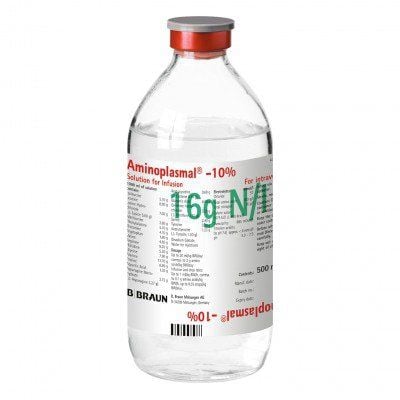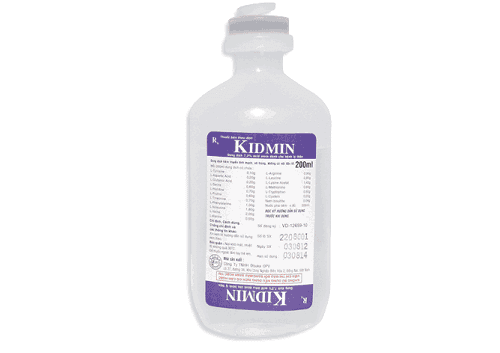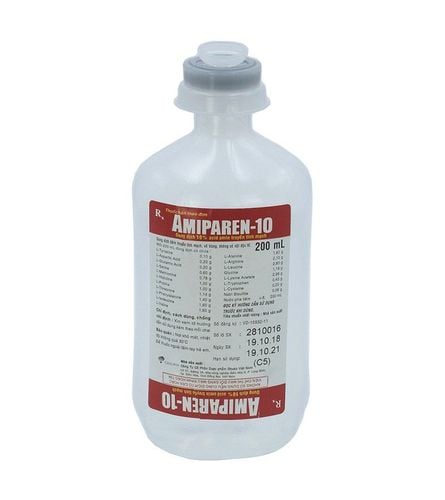This is an automatically translated article.
Aminosyn 10% is an amino acid infusion. Aminosyn is used to provide nutrition to the body through intravenous infusion. So how should Aminosyn be used?
1. What are the effects of Aminosyn?
Aminosyn belongs to the group of intravenous nutritional products, which are composed of amino acids and compounds, minerals.
Aminosyn is formulated as an intravenous infusion and is used to provide amino acids to the body, to help promote protein synthesis and wound healing, and to reduce the rate of endogenous protein catabolism.
Aminosyn 10% is administered as a central intravenous infusion in combination with concentrated dextrose, electrolytes, vitamins, trace metals and ancillary fat supplements, forming total parenteral nutrition.
2. Usage and dosage of Aminosyn
Aminosyn is used by injection as prescribed by the doctor. The infusion is carried out by medical personnel or doctors. The drug is given into a vein over a period of time, and when it does, the patient needs to follow the doctor's instructions.
3. Side effects of the drug Aminosyn
Although it may be rare, some people can experience very serious and sometimes fatal side effects when taking Aminosyn . Tell your doctor or get medical help right away if you have any of the following very serious side effects:
Signs of an allergic reaction: rash; urticaria; itchy; red, swollen, blistering, peeling skin with or without fever; wheeze; chest or throat tightness; trouble breathing, swallowing, or talking; unusual hoarseness; swelling of the mouth, face, lips, tongue, or throat. Fluid and electrolyte signs while taking Aminosyn: mood swings, confusion, muscle pain or weakness, irregular heartbeat, dizziness or fainting, heart palpitations, seizures, increased thirst, feeling very tired or weak, not hungry, urinary retention or change in the amount of urine, stomach pain, dry mouth, severe vomiting, dry eyes. Signs of high blood ammonia levels while taking Aminosyn: irregular heartbeat, breathing, slow heartbeat, convulsions, confusion, hangover, pale skin, sweating. Liver signs: dark urine, fatigue, not hungry, stomach or stomach pain, pale stools, vomiting, yellowing of the skin or eyes. Signs of high or low blood pressure while taking Aminosyn: very severe headache or dizziness, fainting, or vision changes. Other signs: Pale skin, pale lips, pale fingernails, or toes, heavy sweating, trouble breathing, heavy weight gain or swelling in hands or feet, chest pain, coughing up blood, fever or chills. Aminosyn may cause vein irritation. If the medicine leaks from a vein, irritation around that area may be caused. If you notice any signs of redness, burning, pain, swelling or fluid leakage during the infusion of the drug into the body, immediately notify the treating doctor or medical staff.
4. Some notes when using Aminosyn
Before taking Aminosyn, the patient needs to tell the doctor about a history of allergy to amino acids or any other ingredients or allergies. In addition, it is also important to inform your doctor about your medical history and health conditions including: liver disease, kidney disease, difficulty urinating, low blood volume, high blood ammonia levels, amino acid metabolism disorders, electrolyte problems or too much lung fluid.
If surgical treatment, including minor dental surgery, is required, inform your doctor that you are taking Aminosyn .
Tell your doctor about an allergy to sulfites. During the course of taking the drug, the patient needs to have a blood test at the request of the doctor.
If Aminosyn is used for a long time, it can cause aluminum toxicity, especially, the risk is higher in people with kidney disease or premature babies.
Aminosyn can be mixed with parenteral nutrition products and increase the likelihood of blood clots, leading to liver, lung problems, infections, and even death.
People with diabetes need to be careful when taking Aminosyn, it is best to consult a doctor before taking because the drug contains dextrose.
Elderly people (over 65 years old) need to be cautious when taking Aminosyn, because of the higher risk of side effects.
Children who want to use drugs need to have a doctor's prescription and guidance.
Women who are pregnant or breastfeeding should consult their doctor before taking Aminosyn and should weigh the risks and benefits of taking the drug to the fetus and nursing infant.
To ensure the safety of Aminosyn infusion and limit drug interactions, the patient needs to tell the doctor about the drugs he has been using, including prescription drugs or not, herbal products and functions. additional capabilities.
The use of Aminosyn 10% is to provide amino acids and nutrients to the body through intravenous infusion. Therefore, when planning to use the drug, the patient should consult the doctor to have the appropriate indications.
Please dial HOTLINE for more information or register for an appointment HERE. Download MyVinmec app to make appointments faster and to manage your bookings easily.













